行为动词的一般现在时及相应练习
- 格式:doc
- 大小:30.00 KB
- 文档页数:2
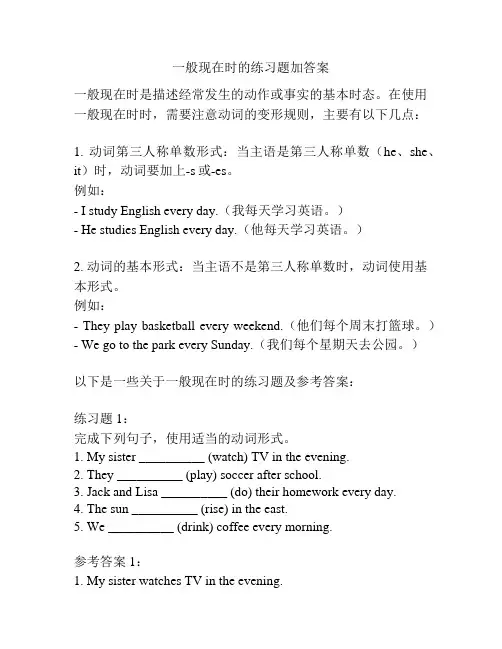
一般现在时的练习题加答案一般现在时是描述经常发生的动作或事实的基本时态。
在使用一般现在时时,需要注意动词的变形规则,主要有以下几点:1. 动词第三人称单数形式:当主语是第三人称单数(he、she、it)时,动词要加上-s或-es。
例如:- I study English every day.(我每天学习英语。
)- He studies English every day.(他每天学习英语。
)2. 动词的基本形式:当主语不是第三人称单数时,动词使用基本形式。
例如:- They play basketball every weekend.(他们每个周末打篮球。
)- We go to the park every Sunday.(我们每个星期天去公园。
)以下是一些关于一般现在时的练习题及参考答案:练习题1:完成下列句子,使用适当的动词形式。
1. My sister __________ (watch) TV in the evening.2. They __________ (play) soccer after school.3. Jack and Lisa __________ (do) their homework every day.4. The sun __________ (rise) in the east.5. We __________ (drink) coffee every morning.参考答案1:1. My sister watches TV in the evening.2. They play soccer after school.3. Jack and Lisa do their homework every day.4. The sun rises in the east.5. We drink coffee every morning.练习题2:选择适当的动词形式填空。
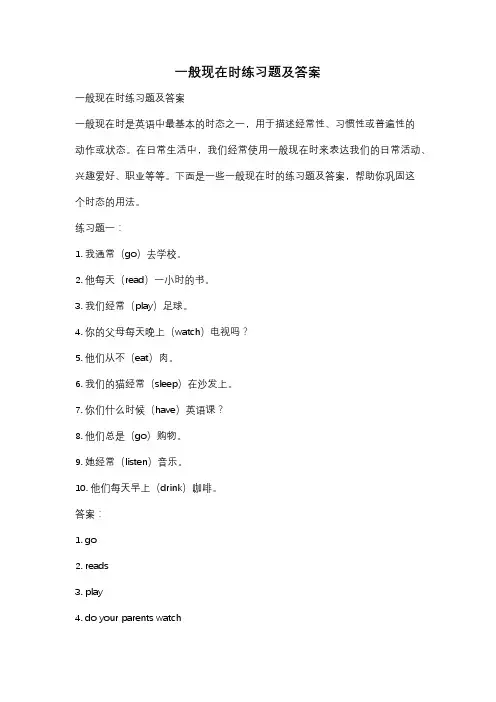
一般现在时练习题及答案一般现在时练习题及答案一般现在时是英语中最基本的时态之一,用于描述经常性、习惯性或普遍性的动作或状态。
在日常生活中,我们经常使用一般现在时来表达我们的日常活动、兴趣爱好、职业等等。
下面是一些一般现在时的练习题及答案,帮助你巩固这个时态的用法。
练习题一:1. 我通常(go)去学校。
2. 他每天(read)一小时的书。
3. 我们经常(play)足球。
4. 你的父母每天晚上(watch)电视吗?5. 他们从不(eat)肉。
6. 我们的猫经常(sleep)在沙发上。
7. 你们什么时候(have)英语课?8. 他们总是(go)购物。
9. 她经常(listen)音乐。
10. 他们每天早上(drink)咖啡。
答案:1. go2. reads3. play4. do your parents watch5. eat6. sleeps7. do you have8. go9. listens to10. do they drink练习题二:1. 你通常几点起床?2. 他们每周末去哪里?3. 你的朋友们喜欢什么运动?4. 你们的狗喜欢吃什么食物?5. 他们多久去一次健身房?6. 你们的邻居是干什么的?7. 你每天晚上做什么?8. 他们有多少个孩子?9. 你喜欢什么颜色?10. 他们通常什么时候吃晚饭?答案:1. What time do you usually get up?2. Where do they go on weekends?3. What sports do your friends like?4. What food does your dog like?5. How often do they go to the gym?6. What do your neighbors do?7. What do you do every evening?8. How many children do they have?9. What color do you like?10. When do they usually have dinner? 练习题三:1. 我们经常(go)购物。
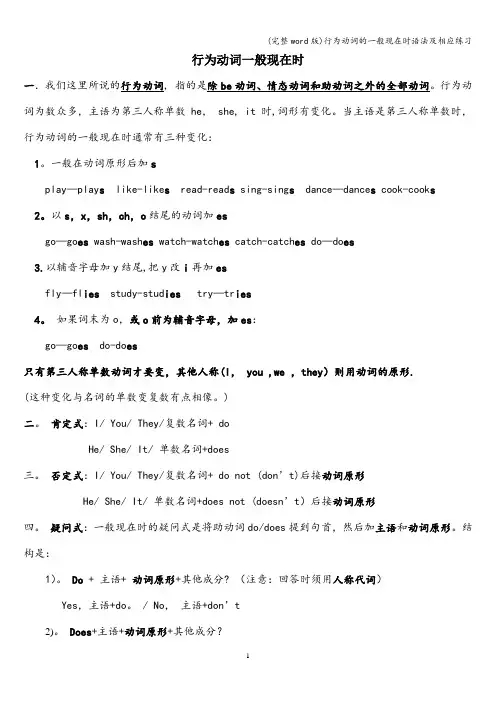
行为动词一般现在时一.我们这里所说的行为动词, 指的是除be动词、情态动词和助动词之外的全部动词。
行为动词为数众多,主语为第三人称单数he, she, it时,词形有变化。
当主语是第三人称单数时,行为动词的一般现在时通常有三种变化:1。
一般在动词原形后加splay—play s like-like s read-read s sing-sing s dance—dance s cook-cook s2。
以s,x,sh,ch,o结尾的动词加esgo—go es wash-wash es watch-watch es catch-catch es do—do es3.以辅音字母加y结尾,把y改i再加esfly—fl ies study-stud ies try—tr ies4。
如果词末为o,或o前为辅音字母,加es:go—go es do-do es只有第三人称单数动词才要变,其他人称(I, you ,we ,they)则用动词的原形.(这种变化与名词的单数变复数有点相像。
)二。
肯定式:I/ You/ They/复数名词+ doHe/ She/ It/ 单数名词+does三。
否定式:I/ You/ They/复数名词+ do not (don’t)后接动词原形He/ She/ It/ 单数名词+does not (doesn’t)后接动词原形四。
疑问式:一般现在时的疑问式是将助动词do/does提到句首,然后加主语和动词原形。
结构是:1)。
Do + 主语+ 动词原形+其他成分? (注意:回答时须用人称代词)Yes,主语+do。
/ No,主语+don’t2)。
Does+主语+动词原形+其他成分?Yes,主语+does。
/ No, 主语+doesn’t.(注意:回答时须用人称代词)五. 那么,什么情况下用行为动词的一般现在时呢?当这个动作经常发生或表示习惯性的动作时,通常用一般现在时,它经常与表示频度的时间状语连用,如,当句子中有every day every year ,on Sunday, in the morning ,often, sometimes,usually, at one o’clock等词时,用一般现在时。

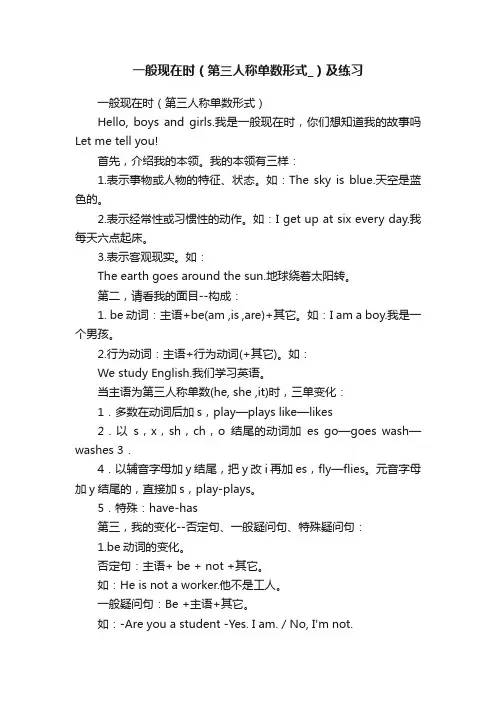
一般现在时(第三人称单数形式_)及练习一般现在时(第三人称单数形式)Hello, boys and girls.我是一般现在时,你们想知道我的故事吗Let me tell you!首先,介绍我的本领。
我的本领有三样:1.表示事物或人物的特征、状态。
如:The sky is blue.天空是蓝色的。
2.表示经常性或习惯性的动作。
如:I get up at six every day.我每天六点起床。
3.表示客观现实。
如:The earth goes around the sun.地球绕着太阳转。
第二,请看我的面目--构成:1. be动词:主语+be(am ,is ,are)+其它。
如:I am a boy.我是一个男孩。
2.行为动词:主语+行为动词(+其它)。
如:We study English.我们学习英语。
当主语为第三人称单数(he, she ,it)时,三单变化:1.多数在动词后加s,play—plays like—likes2.以s,x,sh,ch,o结尾的动词加es go—goes wash—washes 3.4.以辅音字母加y结尾,把y改i再加es,fly—flies。
元音字母加y结尾的,直接加s,play-plays。
5.特殊:have-has第三,我的变化--否定句、一般疑问句、特殊疑问句:1.be动词的变化。
否定句:主语+ be + not +其它。
如:He is not a worker.他不是工人。
一般疑问句:Be +主语+其它。
如:-Are you a student -Yes. I am. / No, I'm not.特殊疑问句:疑问词+一般疑问句。
如:Where is my bike2.行为动词的变化。
否定句:主语+ don't( doesn't ) +动词原形(+其它)。
如:I don't like bread.当主语为第三人称单数时,要用doesn't构成否定句。
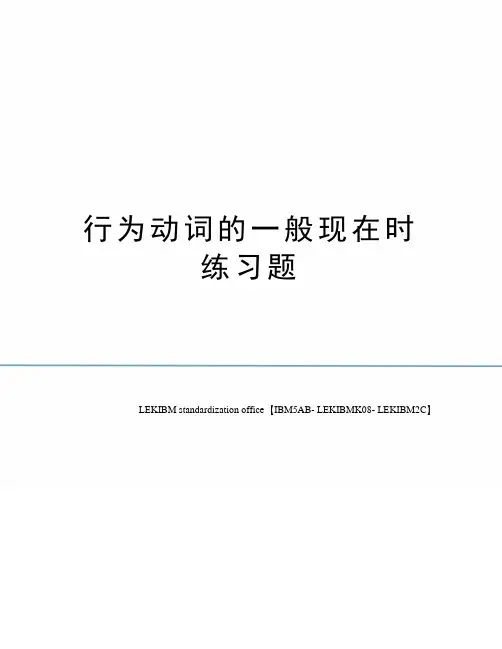
行为动词的一般现在时练习题LEKIBM standardization office【IBM5AB- LEKIBMK08- LEKIBM2C】行为动词的一般现在时态的学习一.行为动词:除be动词、情态动词、助动词以外的动词,也叫实义动词。
二.概念:一般现在时表示经常发生的动作或存在的状态。
三.常与always、often、usually、sometimes、every day、in the morning、on Sundays等时间状语连用。
如:We go to school every day.He often does his homework in the evening.China is a big country.四.用法:1)表示经常性的动作 2)表示客观真理、客观存在、科学事实 3)表示格言或警句4)表示现在时刻的状态、能力、性格、个性 5)在时间和条件状语从句中代表一般将来时。
五.构成:一般现在时主要用动词原形,如果主语是第三人称单数动词变三单,具体规则如下:1.直接在词尾加s,如:play– play s2.词尾是o,s,x,sh,ch的,直接加es,如: pass--passes wash--washes fix--fixes watch—watches3.以辅音加y结尾的,把y变为i,再加es,如:study—studies4.不规则变化的:have--has 六.难点:当句子主语是第三人称单数时,谓语动词要用第三人称单数形式。
七.句型转换:1.否定句:在行为动词的前面加don’t或doesn’t(does not),注意谓语动词要还原为动词原形。
( 1 )I play basketball on Wednesday..I don’t play basketball on Wednesday.( 2 )Lily has breakfast every day.Lily doesn’t have breakfast every day.2.一般疑问句:在句首加助动词do或does,后面的谓语动词还原为动词原形.3.肯定与否定回答:Yes, 主+ do/does./ No, 主+ do/doesn’t.Does he have breakfast every dayYes, he does./ No, he doesn’t.行为动词的一般现在时练习题一、写出下列动词的第三人称单数1、clean_____2、read_____3、make ___4、look ____5、 play___6、pass____7、wash____8、fix_______9、watch_____10、do_______11、fly二、写出下列动词的正确形式:1、I (go) to school at seven in the morning.2. Mike ( do) his homework at eight in the evening.3. His father often ( read) books in the library onSaturday.mother usually (watch) TV plays at home.5. My cousin sometimes (play ) cards with me.6. you often (study ) after schoolYes , I do.7. Mike and Tom usually (fly ) kites on Sunday.8. They (go) to school by bus every day.9. She (go ) to school by bus every day.usually (listen ) to the radio in the morning.11. He usually (listen ) to the radio in the morning.12. he usually (listen ) to the music at home?---No, he .三、用括号内动词适当的形式填空often_________(play) in the playground.2.He often________ (get) up at six o’clock.3._____you___ (brush) your teeth every morning.4. What___(do) he usually____(do) after school?5. ________ they ____________(like) the World Cup?6.Mike sometimes __________(go) to the park with his sister.7.At eight at night, she_ (watch) TV with his parents. 8_____ Mike_____ (read) English every day?9.How many lessons_your classmate________(have) on Monday?10.What time_his mother(do) the housework?11. He often ________(have) dinner at home.12. Daniel and Tommy _______(be) in Class One.. 1313. We _______(not watch) TV on Monday.14. Nick _______(not go) to the zoo on Sunday.15. ______ they ________(like) the World Cup?四、句型转换。
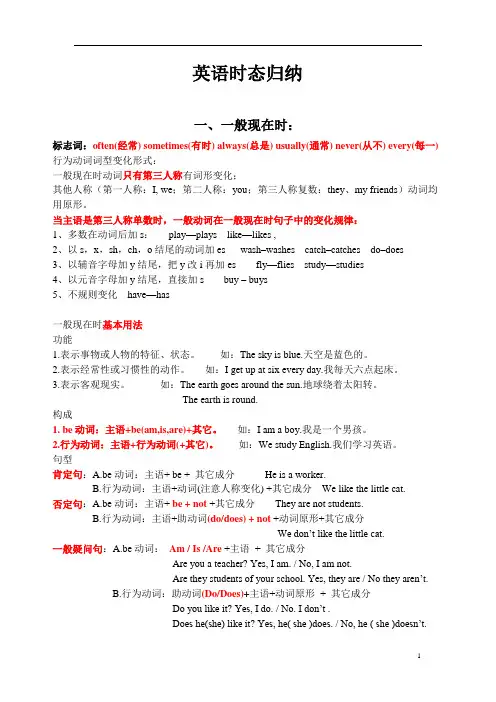
英语时态归纳一、一般现在时:标志词:often(经常) sometimes(有时) always(总是) usually(通常) never(从不) every(每一)行为动词词型变化形式:一般现在时动词只有第三人称有词形变化;其他人称(第一人称:I, we;第二人称:you;第三人称复数:they、my friends)动词均用原形。
当主语是第三人称单数时,一般动词在一般现在时句子中的变化规律:1、多数在动词后加s:play—plays like—likes ,2、以s,x,sh,ch,o结尾的动词加es wash–washes catch–catches do–does3、以辅音字母加y结尾,把y改i再加es fly—flies study—studies4、以元音字母加y结尾,直接加s buy – buys5、不规则变化have—has一般现在时基本用法功能1.表示事物或人物的特征、状态。
如:The sky is blue.天空是蓝色的。
2.表示经常性或习惯性的动作。
如:I get up at six every day.我每天六点起床。
3.表示客观现实。
如:The earth goes around the sun.地球绕着太阳转。
The earth is round.构成1. be动词:主语+be(am,is,are)+其它。
如:I am a boy.我是一个男孩。
2.行为动词:主语+行为动词(+其它)。
如:We study English.我们学习英语。
句型肯定句:A.be动词:主语+ be + 其它成分He is a worker.B.行为动词:主语+动词(注意人称变化) +其它成分We like the little cat.否定句:A.be动词:主语+ be + not+其它成分They are not students.B.行为动词:主语+助动词(do/does) + not+动词原形+其它成分We don’t like the little cat.一般疑问句:A.be动词:Am / Is /Are +主语+ 其它成分Are you a teacher? Yes, I am. / No, I am not.Are they students of your school. Yes, they are / No they aren’t.B.行为动词:助动词(Do/Does)+主语+动词原形+ 其它成分Do you like it? Yes, I do. / No. I don’t .Does he(she) like it? Yes, he( she )does. / No, he ( she )doesn’t.特殊疑问句:疑问词+ 一般疑问句A.be动词:How many students are there in your school?B.行为动词:What do you usually do on Sunday?一般现在时动词be和have的变化形式1.动词Be 叫连系动词, 用法:第一人称单数用am,第三人称单数用is,其它人称用are。
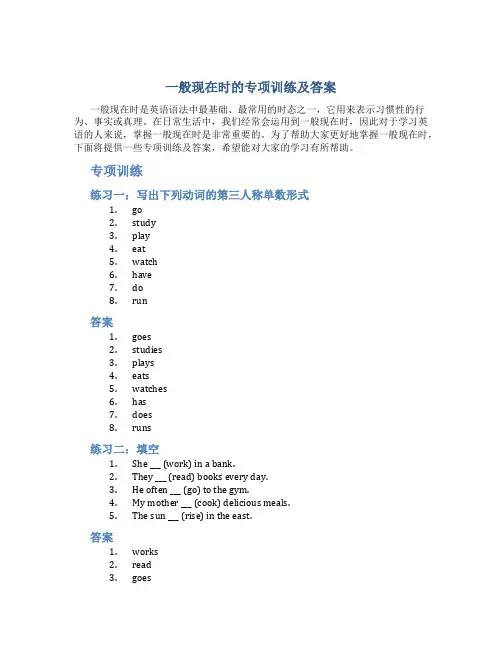
一般现在时的专项训练及答案一般现在时是英语语法中最基础、最常用的时态之一,它用来表示习惯性的行为、事实或真理。
在日常生活中,我们经常会运用到一般现在时,因此对于学习英语的人来说,掌握一般现在时是非常重要的。
为了帮助大家更好地掌握一般现在时,下面将提供一些专项训练及答案,希望能对大家的学习有所帮助。
专项训练练习一:写出下列动词的第三人称单数形式1.go2.study3.play4.eat5.watch6.have7.do8.run答案1.goes2.studies3.plays4.eats5.watches6.has7.does8.runs练习二:填空1.She ___ (work) in a bank.2.They ___ (read) books every day.3.He often ___ (go) to the gym.4.My mother ___ (cook) delicious meals.5.The sun ___ (rise) in the east.答案1.works2.read3.goes4.cooks5.rises练习三:改为一般现在时1.She is reading a book.2.They are playing football.3.He is cooking dinner.4.I am going to the park.5.The train is arriving at 9 p.m.答案1.She reads a book.2.They play football.3.He cooks dinner.4.I go to the park.5.The train arrives at 9 p.m.结语通过以上的专项训练,相信大家对一般现在时有了更深入的理解。
在学习语法的过程中,多做练习是非常重要的,希望大家能够坚持下去,不断提升自己的英语水平。
如果还有不明白的地方,可以随时向老师请教或寻求帮助,共同进步!。

行为动词的一般现在时一、行为动词指的是除be动词、情态动词和助动词之外的全部动词。
二、当句子使用一般现在时、主语为第三人称单数he,she,it时,作为谓语的行为动词需加“-s”。
三、什么情况下用行为动词的一般现在时呢?当这个动作经常发生或表示习惯性的动作时,通常用一般现在时,它经常与表示频度的时间状语连用。
例如:当句子中有every day,every year,on Sunday,in the morning,often,sometimes,usually等词时,我们通常用一般现在时。
例如:1. get up at six c 'clock every day.我每天早上6点起床。
2. He usually gets up at nine o'clock on Sundays.他周日通常9点起床。
3.She often smokes.她经常抽烟。
4. I phone my parents once a week.我每周给父母打一次电话。
四、行为动词的一般现在时还可以用来表达客观真理和科学事实。
例如1. Three and four makes seven.3加4等于7。
2. The earth moves around the sun.地球绕着太阳转。
3. Shenyang lies in the north of China.沈阳位于中国的北部。
五、行为动词一般现在时的常用句型:1.肯定句,主语+动词(注意人称变化)+…。
例如:1)I have a dog.我有一只狗。
2) We like that little cat.我们喜欢那只小猫。
3) She sings well.她歌唱得很好。
2.否定句,主语+助动词( (do/ does)+not+动词原形+…例如:1) He doesn't have a dog.他没有狗。
2) We don't like that little cat.我们不喜欢那只小猫。
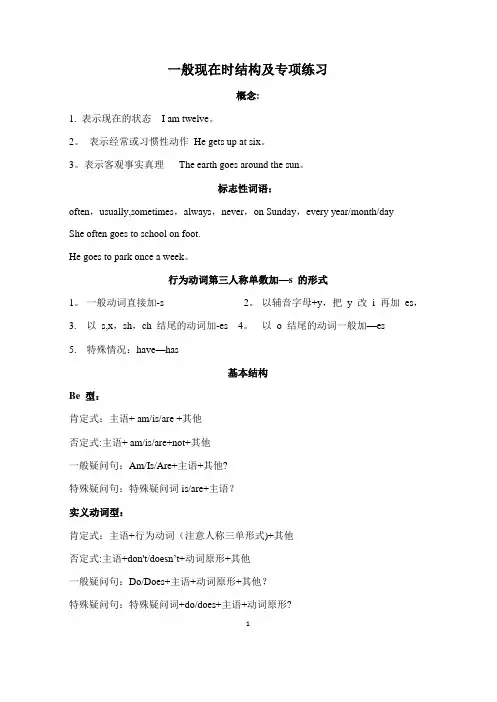
一般现在时结构及专项练习概念:1. 表示现在的状态I am twelve。
2。
表示经常或习惯性动作He gets up at six。
3。
表示客观事实真理The earth goes around the sun。
标志性词语:often,usually,sometimes,always,never,on Sunday,every year/month/dayShe often goes to school on foot.He goes to park once a week。
行为动词第三人称单数加—s 的形式1。
一般动词直接加-s 2。
以辅音字母+y,把y 改i 再加es,3. 以s,x,sh,ch 结尾的动词加-es 4。
以o 结尾的动词一般加—es5. 特殊情况:have—has基本结构Be 型:肯定式:主语+ am/is/are +其他否定式:主语+ am/is/are+not+其他一般疑问句:Am/Is/Are+主语+其他?特殊疑问句:特殊疑问词is/are+主语?实义动词型:肯定式:主语+行为动词(注意人称三单形式)+其他否定式:主语+don't/doesn’t+动词原形+其他一般疑问句:Do/Does+主语+动词原形+其他?特殊疑问句:特殊疑问词+do/does+主语+动词原形?1写出下列动词的第三人称形式wash: watch:study:finish:go:snow:carry:stop:see:drive:let:teach:keep:join:put:do:drink:enjoy play:begin:take:run: fly:talk:stay:look:think:carry: fix:单项选择1。
There _____ an English film at the cinema now.A:is B:are C:am D:be2. The picture nic e. A:look B:looks C:looked D:be look3. He sits down and soon asleep.A:fall B:falling C:falled D:falls4。
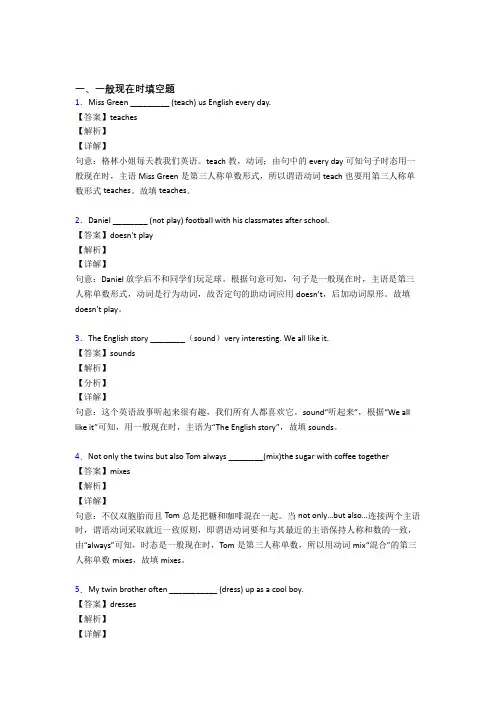
一、一般现在时填空题1.Miss Green _________ (teach) us English every day.【答案】teaches【解析】【详解】句意:格林小姐每天教我们英语。
teach教,动词;由句中的every day可知句子时态用一般现在时,主语Miss Green是第三人称单数形式,所以谓语动词teach也要用第三人称单数形式teaches。
故填teaches。
2.Daniel ________ (not play) football with his classmates after school.【答案】doesn’t play【解析】【详解】句意:Daniel 放学后不和同学们玩足球。
根据句意可知,句子是一般现在时,主语是第三人称单数形式,动词是行为动词,故否定句的助动词应用doesn’t,后加动词原形。
故填doesn’t play。
3.The English story ________(sound)very interesting. We all like it.【答案】sounds【解析】【分析】【详解】句意:这个英语故事听起来很有趣,我们所有人都喜欢它。
sound“听起来”,根据“We all like it”可知,用一般现在时,主语为“The English story”,故填sounds。
4.Not only the twins but also Tom always ________(mix)the sugar with coffee together【答案】mixes【解析】【详解】句意:不仅双胞胎而且Tom总是把糖和咖啡混在一起。
当not only…but also…连接两个主语时,谓语动词采取就近一致原则,即谓语动词要和与其最近的主语保持人称和数的一致,由“always”可知,时态是一般现在时,Tom是第三人称单数,所以用动词mix“混合”的第三人称单数mixes,故填mixes。
一、练习题:今天我们来复习《在一般现在时里行为动词的用法》。
首先,我们来翻译下面的句子吧!1、我们每天都去上学。
肯定句:__________________________________ 否定句:__________________________________ 一般疑问句:______________________________ 简短回答:________________________________ 2、他们下课后打扫教室。
肯定句:__________________________________ 否定句:__________________________________ 一般疑问句:______________________________ 简短回答:________________________________ 3、有时候你们在操场上踢足球。
肯定句:__________________________________ 否定句:__________________________________ 一般疑问句:______________________________ 简短回答:________________________________ 4、我在晚上做作业。
肯定句:__________________________________ 否定句:__________________________________ 一般疑问句:______________________________ 简短回答:________________________________ 5、你喜欢英语。
肯定句:__________________________________ 否定句:__________________________________ 一般疑问句:______________________________ 简短回答:________________________________ 6、她经常在7点钟起床。
中小学精品小班课外辅导培优专题一一般现在时教学目标:1.掌握be动词的一般现在时;2.掌握实义动词的一般现在时。
重点难点:1.重点:行为动词引导的一般现在时;2.难点:当主语为第三人称单数时行为动词的变化。
一般现在时表示习惯性、经常发生的动作或存在的状态,以及客观存在的普遍真理等。
常与often, usually, sometimes,always,everyday等词连用。
1.He is my friend. We often go to school together.2.I am a student. I am twelve years old.3.He teaches English.4.There are four seasons in a year.5.The earth goes around the sun.分类:其主要形式分两大类:一类是含有be动词的句子,一类是含有实义动词的句子。
(一)be动词的一般现在时be动词的一般现在时有三种形式,即:am, is, are。
1. 如果主语是第一人称I(我)时,be动词用am。
如:I am a student. 我是一名学生。
I am 还可缩写成I'm。
如: I'm David. 我是大卫。
2. 如果主语是you (你,你们), they (他们,它们,她们)或名词复数(两个以上的人或物)时,be动词必须用are。
如:Are you twelve? 你是十二岁吗?Tom and Lily are good friends. 汤姆和莉莉是好朋友。
They are at school. 他们在学校。
are与主语还可缩写。
如: We are= We're, They are =They're, You are = You're。
而are与 not可缩写成aren't。
如:They aren't students. 他们不是学生。
行为动词的一般现在时语法及相应练习一般现在时是英语中最常用的时态之一,用来表达经常性的动作、惯、情况或真理。
下面是一般现在时的语法规则及相应的练。
语法规则1. 一般现在时表示现在经常发生的动作或存在的状态。
- 结构:主语 + 行为动词原形(第三人称单数加-s/es)- 例如:- I go to school every day.- He reads a book before bed.2. 在第三人称单数形式,一般动词需要加上 -s 或 -es 结尾。
- 主语是第三人称单数形式时,在动词后面加 -s 或 -es。
- 例如:- He plays soccer on the weekends.- She brushes her teeth twice a day.3. 情态动词和助动词的用法不受人称和数的变化影响,保持原形。
- 例如:- I can swim.- He must study.练题填入适当的动词形式:1. My sister always __________ (read) a book before going to bed.2. Peter and Mary __________ (go) to the park every Sunday.3. They __________ (play) tennis every afternoon.4. Kate __________ (eat) a sandwich for lunch.5. The sun __________ (rise) in the east.6. John usually __________ (watch) TV in the evening.7. Tom __________ (listen) to music while he works.8. We __________ (drink) coffee in the morning.9. The cat __________ (sleep) on the sofa.10. My parents often __________ (go) for a walk after dinner.参考答案1. reads2. go3. play4. eats5. rises6. watches7. listens8. drink9. sleeps10. go。
一般现在时专项练习及答案一般现在时是英语中最基础的时间态之一,它用来描述经常发生的动作、事实、习惯或现有的状态。
在学习一般现在时时,我们需要掌握动词的变化规则以及它的正确用法。
本文将提供一些专项练习,并附上答案,以帮助大家更好地理解和运用一般现在时。
练习一:动词的正确形式填空1. My sister _________ (work) in a bank.2. Tom usually __________ (go) to school by bus.3. They _________ (like) to play basketball on weekends.4. I _________ (watch) TV every evening.5. We _________ (study) English at the moment.6. She _________ (not like) coffee.7. He _________ (play) the guitar very well.8. The sun _________ (rise) in the east.9. It _________ (snow) in winter.10. They _________ (visit) their grandparents every summer.答案:1. works2. goes3. like4. watch5. are studying6. doesn't like7. plays8. rises9. snows10. visit练习二:选择正确的谓语动词形式1. He always __________ (watch/watches) movies on weekends.2. The cat _________ (is/are) sleeping on the sofa.3. They _________ (doesn't/don't) like to eat spicy food.4. We usually _________ (go/goes) to the park after dinner.5. The train _________ (arrives/arrive) at 9 o'clock every morning.6. She _________ (plays/play) the piano very well.7. My parents _________ (work/works) in a hospital.8. The dog _________ (barks/bark) loudly every night.9. It _________ (rains/rain) a lot in this season.10. The students _________ (listens/listen) carefully in class.答案:1. watches2. is3. don't4. go5. arrives6. plays7. work8. barks9. rains10. listen练习三:改错题1. She studies English every day.2. I am not like vegetables.3. The sun rises in the west.4. They doesn't play basketball.5. He usually takes the train to work.6. The birds fly in the sky.7. My brother like playing soccer.8. She don't have any siblings.9. It snowing heavily outside.10. We watches TV in the evening.答案:1. 正确2. am not likes3. rises in the east4. doesn't play5. 正确6. fly in the sky7. likes playing soccer8. doesn't have any siblings9. is snowing heavily10. watch TV in the evening练习四:根据提示写句子1. Mary usually __________ (wake up) at 7 o'clock.2. They _________ (not eat) meat.3. Tom _________ (brush) his teeth before bed.4. The train __________ (leave) at 8:30.5. We __________ (not play) tennis on Sundays.6. She __________ (like) to read books.7. The students __________ (study) hard for the exam.8. It __________ (rain) a lot in this city.9. The dog always __________ (bark) at strangers.10. He __________ (not watch) TV in the morning.答案:1. wakes up2. don't eat3. brushes4. leaves5. don't play6. likes7. study8. rains9. barks10. doesn't watch掌握了一般现在时的基本用法和动词形式后,我们就能准确地描述日常生活中发生的动作、事实和习惯。
行为动词的一般现在时练习题1.play → plays2.pass → passes3.fix → fixes4.watch → watches5.study → studies6.have → has二、根据句意填空:1.She ____________ (always。
play) the piano after dinner.2.The sun ____________ (rise) in the east.3.He ____________ (not。
like) spicy food.4.Do you ____________ (usually。
eat) breakfast in the morning?5.My sister ____________ (not。
have) a car.三、改写句子:1.XXX(改为否定句)XXX.2.We watch TV in the evening。
(改为一般疑问句) Do we watch TV in the evening?3.Does she speak English well。
(作肯定回答) Yes。
she does.1.Clean2.Read3.Make4.Look5.Play6.Pass7.Wash8.Fix9.Watch10.Do11.Fly12.StudyCorrected sentences:1.I go to school at seven in the morning.2.Mike does his homework at eight in the evening.3.His father often reads books in the library on Saturdays.4.XXX.5.XXX.6.Do you often study after school。
Yes。
I do.7.Mike and Tom usually fly kites on Sunday.8.They go to school by bus every day.9.She goes to school by bus every day.10.We usually listen to the。
行为动词一般现在时的变化
我们这里所说的行为动词,指的是除be动词、情态动词和助动词之外的全部动词。
行为动词为数众多,主语为第三人称单数he, she, it 时,词形有变化。
当主语是第三人称单数时,行为动词的一般现在时通常有三种变化:
1、多数在动词后加s
play—play s like—like s read-read s sing-sing s dance-dance s cook- cook s look- look s
2、以s,x,sh,ch,o结尾的动词加es
go—go es wash—wash es watch-watch es catch-catch es
do- do es
3、以辅音字母加y结尾,把y改i再加es
fly—fl ies study—stud ies try-tr ies
(这种变化与名词的单数变复数有点相像)
那么,什么情况下用行为动词的一般现在时呢?
当这个动作经常发生或表示习惯性的动作时,通常用一般现在时,它经常与表示频度的时间状语连用,如,当句子中有every day every year ,on Sunday, in the morning ,often, sometimes, usually, at one o’clock等词时,用一般现在时。
例句:He get s up at 6 o’clock.
She usually watch es TV in the evening.
Sometimes he go es to school by car.
Tom often fl ies a kite on Sunday.
只有第三人称单数动词才要变,其他人称(I, you ,we ,they)则用动词的原形。
行为动词的一般现在时练习题
班级姓名座号
写出下列动词的正确形式:
1、I (go) to school at seven in the morning.
2. Mike ( do) his homework at eight in the evening.
3. His father often ( read) books in the library on Saturday.
4.My mother usually (watch) TV plays at home.
5. My cousin sometimes (play ) cards with me.
6. you often (study ) after school ?Yes ,
I do.
7. Mike and Tom usually (fly ) kites on Sunday.
8. They (go) to school by bus every day.
9. She (go ) to school by bus every day.
10.We usually (listen ) to the radio in the morning.
11. He usually (listen ) to the radio in the morning.
12. he usually (listen ) to the music at home? No, he .。